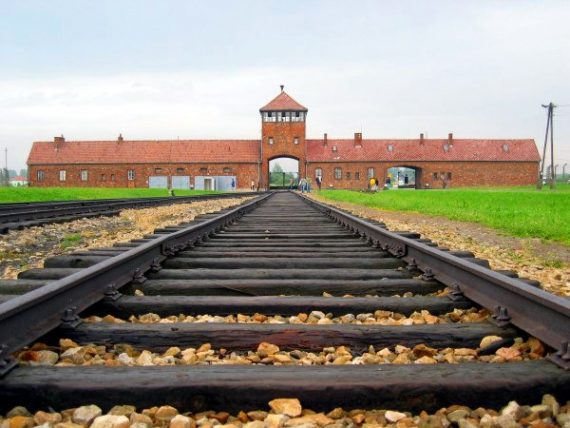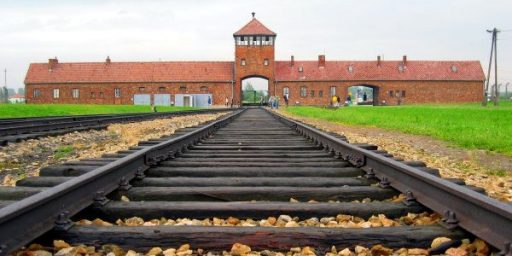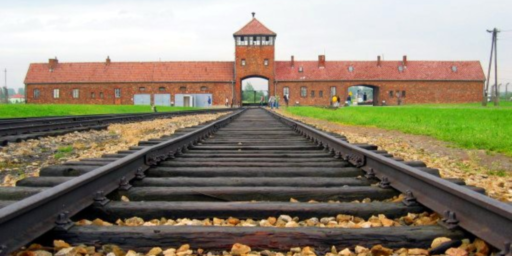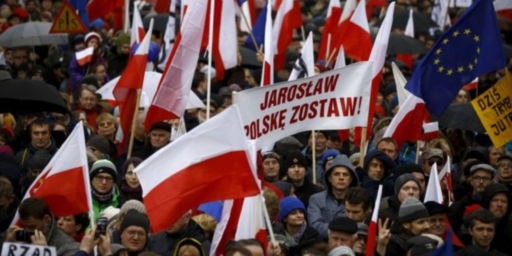Polish President Signs Controversial Holocaust Bill Into Law
Poland's President has signed a controversial bill that purports to criminalize any effort to tie Poland to the Holocaust.
Just days after the measure had been passed by the upper chamber of Poland’s Parliament, Polish President Andrzej Duda has signed into law a controversial bill that effectively criminalizes any effort to mention Polish collaboration with Nazis during World War Two to round up Jewish citizens who were sent to die in a concentration camp:
WARSAW, Poland — Poland’s president on Tuesday signed legislation that outlaws blaming Poland as a nation for Holocaust crimes committed by Nazi Germany, defying both criticism from Israel and a warning from the U.S.
But in a move that appeared designed to soften the impact of his decision, President Andrzej Duda said he would also ask Poland’s constitutional court to evaluate the bill — leaving open the possibility it would be amended.
As currently written, the legislation calls for prison terms of up to three years for falsely attributing the crimes of Nazi Germany to Poland. The law takes effect 14 days after it’s officially published, but it wasn’t immediately clear when that will be.
Poland’s authorities have described it as an attempt to protect the country’s reputation from what it believes is confusion about who bears responsibility for Auschwitz and other death camps Nazi Germany set up in occupied Poland. They say it was modeled on anti-defamation laws in many other countries, including laws criminalizing Holocaust denial.
The proposed law has fueled a diplomatic crisis with Israel, which fears it would stifle discussion about the Holocaust and enable Poland to whitewash the role of the Poles who killed or denounced Jews during the German occupation of Poland during World War II.
Israel’s Foreign Ministry said Tuesday that it would continue to communicate with Poland despite its reservations about the law. It said it hopes Duda’s decision to ask the constitutional court to evaluate the bill will allow both sides to “agree on changes and corrections.”
That language seemed more conciliatory than earlier statements, suggesting the sides are seeking compromise.
Duda acknowledged there were doubts about the legislation’s intent, leading some observers to interpret his request for a constitutional review as a way to save face while calming the storm.
But critics say it was a diversionary tactic.
Slawomir Neumann of the centrist Civic Platform party accused Duda of giving in to the pressure of nationalists and anti-Semites and said his signing “deepens the diplomatic crisis.”
Neumann, head of the party’s parliamentary caucus, also described the constitutional court as a body without independence that will rule as the governing party wants.
The United States also strongly opposed the legislation, warning that it could hurt Poland’s strategic relations with both Israel and the U.S.
Holocaust scholars and institutions have strongly denounced the law as well, arguing that its unclear wording creates the potential for abuse. Polish officials note that a provision in the law exempts historic research and works of art.Polish officials have long argued a Holocaust speech law is needed to fight expressions like “Polish death camps” for the Nazi camps where Jews and others were exterminated.
Defending the law, Duda said it would not prohibit Holocaust survivors and witnesses from talking about crimes committed by individual Poles.
“We do not deny that there were cases of huge wickedness,” he said in a speech.
But he said the point of the law is to prevent the Polish nation as a whole from being wrongly accused of institutionalized participation in the Holocaust. He recalled that the Polish government at the time had to go into exile and Polish officials were those who struggled to inform the world that the Germans were putting Jews to death on Polish soil.
Neumann, head of the party’s parliamentary caucus, also described the constitutional court as a body without independence that will rule as the governing party wants.
The United States also strongly opposed the legislation, warning that it could hurt Poland’s strategic relations with both Israel and the U.S.
Holocaust scholars and institutions have strongly denounced the law as well, arguing that its unclear wording creates the potential for abuse. Polish officials note that a provision in the law exempts historic research and works of art.
Polish officials have long argued a Holocaust speech law is needed to fight expressions like “Polish death camps” for the Nazi camps where Jews and others were exterminated.
Defending the law, Duda said it would not prohibit Holocaust survivors and witnesses from talking about crimes committed by individual Poles.
“We do not deny that there were cases of huge wickedness,” he said in a speech.
But he said the point of the law is to prevent the Polish nation as a whole from being wrongly accused of institutionalized participation in the Holocaust. He recalled that the Polish government at the time had to go into exile and Polish officials were those who struggled to inform the world that the Germans were putting Jews to death on Polish soil.
As I said when I wrote about this bill last week, at least part of the explanation for why this bill passed so easily can be seen in the rightward, nationalist drift that we’ve seen in Polish politics in recent years:
This legislation comes at a time when Poland is under the control of an exceedingly conservative government that has taken a variety of controversial steps since taking control of the government in the 2015 Parliamentary elections under the banner of the Law & Justice party. Many of these steps have included backing legislation favored by the Catholic Church regarding issues such as abortion and LGBT rights, of course, but it has also extended to refusing to accept refugees from Syria and other nations who have flooded into Europe over the past several years due to war and terrorism. The party is rooted in a kind of right-wing nationalism that seems to be resonating far more successfully in Eastern Europe than it has in Western Europe, a phenomenon that is likely attributable to both cultural differences and the still potent legacy of nearly fifty years of living as client states of the Soviet Union. Whatever the reasons, though, there’s a difference between a conservative political party and a party that seems intent on wiping the truth of history away in the name of Polish nationalism.
There’s no question that the Holocaust was principally planned, organized, and carried out by the Nazi regime in Germany and that Poland, which was occupied by the Nazis from 1939 until the Red Army pushed the German Army back into Germany in more than five years later. It’s also clear that the camps at which the Holocaust was carried out were located in both Germany and in occupied Poland and were principally staffed by Germans. Additionally, the people who were sent to the camps included not only Jews from across the areas that had been occupied and controlled by the Nazis but also non-Jewish Poles who had either resisted the Nazis or were otherwise targeted for either forced labor in the camps or for death in the death chambers in places such as Auschwitz. Nobody of serious merit has ever argued otherwise as far as I’m aware and certainly nobody has argued that the entire Polish nation welcomed their Nazi occupiers in the same way that, say, Hitler was hailed when the Germans annexed Austria. Therefore, it seems clear that the concerns that Polish officials have voiced as the supposed motivation for this bill are without merit.
It’s also undisputed that those elements of the Polish Government that managed to escape when the Nazis and the Soviet invaded in September 1939 formed a government in exile based primarily in the United Kingdom and that these officials, along with elements of the Polish military who had managed to escape the invasion, assisted the Allies in the war against the Axis Powers. This included the famed 303rd Polish Fighter Squadron, a group of Polish airmen who had escaped Poland and assisted the British during the Battle of Britain and in other operations against the Nazis all the way up to the end of the war in May 1945. Finally, it’s also true that Poland came out of the war having paid a very high price due to the invasions and occupations by Nazi Germany and the Soviet Union as well as the battles that took place on Polish territory when the front passed through there not just once, but twice. Taking all this together I suppose it’s understandable that modern-day Poles as well as those still alive who lived through the war would be upset about those versions of history that sought to tie their nation to the Holocaust.
All that being said, it also cannot be denied that there were collaborators in Poland who assisted the Nazis in their occupation, in rounding up Jews and other people targeted by the Nazis, and who assisted in the operation of the death camps that were used by the Nazis to carry out the Holocaust. In many cases, of course, collaboration or cooperation was sometimes necessary to survive in the nation’s that were occupied by the Nazis, including Poland, but it also seems true to say that there was also a subset of the population of collaborators who were people who collaborated for other reasons, including the fact that they sympathized to some degree with Nazi ideology. In that respect, it’s worth noting that anti-Semitism was alive and well in Poland long before the war, and Pograms aimed at Jews were a common occurrence in the past when the nation was still part of the Russian empire. This meant that it wasn’t always very hard for the Nazis to find Poles willing to help them, even when they knew exactly what was going on. The results of all of this were quite grim. By the time the war was over, Poland’s Jewish population, which had numbered more than 3,000,000 people before the war started, was down to just 300,000. Of the 6,000,000 Poles who died during the war, half of them were Jewish. (Source) These are the undeniable truths that this legislation seeks to bury and to even make it criminal to mention not just in Poland but anywhere in the world.
In addition to the effort to whitewash history, as Jazz Shaw notes today at Hot Air, this law is also part of a disturbing trend in Europe:
Making it a crime to even mention a tragic but critical portion of their own history does no service to the Poles and is an insult to the Jews who have to live with the memory of that era. This is ham-fisted suppression of free speech and a move which seems sure to please nobody while angering nearly everyone.
Other examples of this kind of infringement on freedom of speech can be seen in examples from many other parts of Europe, and it’s one of the respects in which political systems on that continent are clearly less welcoming to free speech than we are here in the United States, or at least that’s what we like to tell ourselves even as we live in an era where the President labels any news coverage unfavorable to him as “Fake News” and attacks political rivals who decline to applaud him at a State Of The Union address as ‘un-American’ and ‘treasonous.’ Conservatives and Republicans have long claimed that Democrats want to turn the United States into something resembling the “social democracy” that exists in Europe. With their support of President Trump, it appears that when it comes to free speech, freedom of expression and the right to dissent, those same conservatives and Republicans want to see America become more like Europe as well.






For decades European countries have had “hate speech laws” criminalizing the expression of views regarded as racist or bigoted, including Holocaust denial. As an American who believes strongly in our First Amendment, I have long opposed these laws even when they were being used to outlaw views which I consider vile. Here, we see how these laws, however well-intentioned, can be used as a framework for the exact opposite effect–to aid and abet in the dissemination of the very bigoted pseudo-histories these laws were originally designed to quash.
It feels more and more each day that some people want to repeat history.
@Kylopod:
I’d like to upvote this 1000 times.
@Kathy: You have put your finger on the very thought that most bothers me. I was born in 1945. I am having the terribly disturbing thought that my lifetime might have traversed a blessed period between fascist glaciations. Doesn’t everyone see where this leads?!
@CSK:
Second. Brilliant point from Kylopod.
I would add that Poland has a long history of anti-semitism before the Holocaust. There were many Poles who didn’t just do what they had to; they actively participated. If you ever watch the epic Shoah documentary, they get into this in depth. There’s one scene in particular where a survivor returns to his hometown decades later. All the people talk about how nice he was and how horrible the Holocaust was. And then they start talking about how all the Jews had hidden gold in their homes and were rich.
That’s not to say it was universal or even a big plurality. Thousands of Poles risked their lives helping and saving Jews. But it did exist.